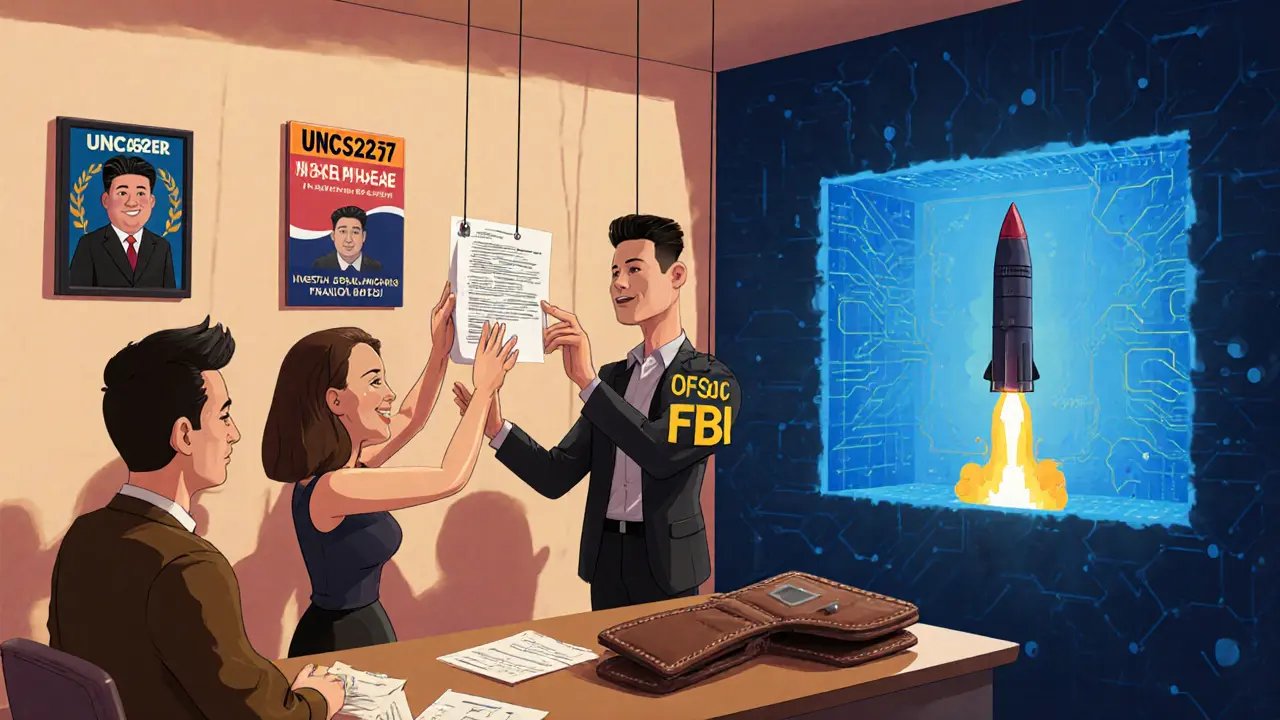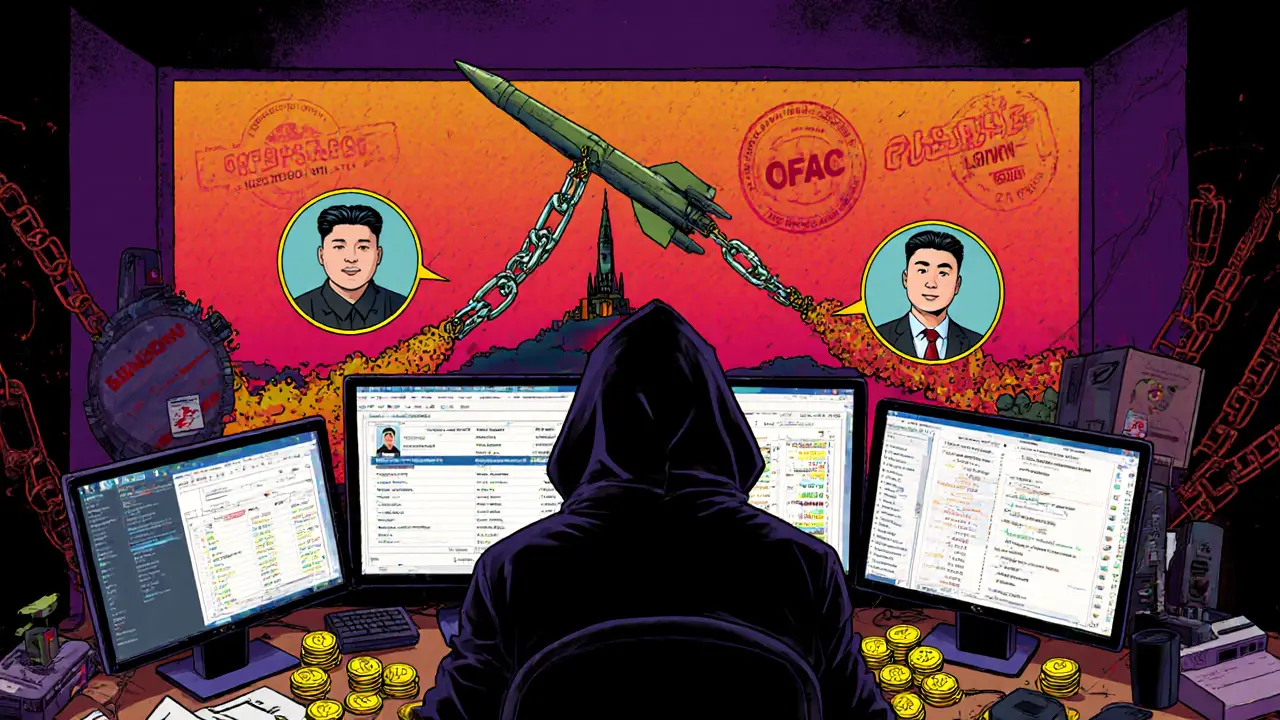North Korea Crypto Theft Calculator
The article states North Korea stole over $2.1B in crypto in 2025. This tool helps visualize what this amount funds.
Real-World Impact
Based on average costs: $1 million = 0.75 missiles, 2.5 military vehicles, or 1.2 nuclear components
Source: U.S. Department of Defense cost estimates, 2025
North Korea has turned cryptocurrency into a weapons factory. While the world watches missile tests and nuclear drills, the regime has quietly built a global cyber theft operation that’s stolen over $2.1 billion in crypto just in the first half of 2025. The U.S. Treasury’s Office of Foreign Assets Control (OFAC) isn’t just reacting - it’s dismantling the whole system, one wallet at a time.
How North Korea Uses Crypto to Fund Weapons
It’s not about Bitcoin speculation or DeFi yields. North Korea’s crypto activity is pure theft. The regime doesn’t mine or trade - it hacks, impersonates, and steals. Its goal? To bypass international sanctions and fund its ballistic missile and nuclear programs. Every stolen ETH, USDC, or NFT flows into a pipeline that ends at weapons labs in Pyongyang.
Since 2021, these operations have generated over $1 million in revenue - but the scale exploded in 2025. According to TRM Labs, North Korean-linked hackers stole more crypto in the first six months of this year than in the entire previous decade combined. The stolen funds aren’t sitting in wallets. They’re being laundered through Russian and UAE-based intermediaries, converted to cash via over-the-counter brokers, and funneled to senior DPRK officials like Kim Sang Man and Sim Hyon Sop - both already under U.S. sanctions.
The IT Worker Scam: Fake Profiles, Real Theft
Here’s how it works: North Korea recruits or coerces individuals to pose as freelance IT workers. They apply to U.S. tech companies - especially crypto startups and Web3 firms - using fake identities. Names like ‘Joshua Palmer’ and ‘Alex Hong’ show up on GitHub, Freelancer, and RemoteHub. Their resumes? Fabricated. Their documents? Stolen. Their skills? Real enough to pass interviews.
Once hired, these workers do actual coding or support tasks. But they’re also planting backdoors, stealing source code, and mapping internal networks. They collect payments in stablecoins like USDC, then quietly drain the funds into wallets controlled by Pyongyang. Some even demand ransom after accessing sensitive systems. It’s espionage disguised as remote work.
Security researchers track these groups under names like Famous Chollima, Jasper Sleet, and UNC5267. They’re not rogue hackers - they’re state-sponsored units tied directly to the Workers’ Party of Korea. And they’re not working alone. They’re supported by front companies like Shenyang Geumpungri Network Technology Co., Ltd and Korea Sinjin Trading Corporation - both sanctioned by OFAC in August 2025.
OFAC’s Sanction Sweep: Who Got Hit and Why
OFAC’s response has been methodical and global. On August 27, 2025, they added Russian national Vitaliy Sergeyevich Andreyev to the sanctions list for helping North Koreans convert crypto into cash. Andreyev isn’t a hacker - he’s a facilitator. His role? Moving stolen digital assets into physical dollars through OTC brokers, some of whom were already sanctioned in late 2024.
Also sanctioned that day: Kim Ung Sun, a North Korean operative who personally handled nearly $600,000 in crypto-to-cash conversions. And two more entities: Korea Sobaeksu Trading Company and its directors Kim Se Un, Jo Kyong Hun, and Myong Chol Min. These companies act as financial bridges between stolen crypto and the DPRK’s central bank.
This wasn’t a one-off. OFAC had already targeted similar networks in July 2025. The pattern? Each new designation builds on the last. It’s a snowball effect - exposing more layers of the network with every action. The Department of Justice also filed a civil forfeiture case in June 2025, seeking over $7.7 million in digital assets tied to these schemes.

How the Theft Moves: From Wallet to Cash
Stolen crypto doesn’t stay on-chain. North Korean operators use a multi-step laundering process:
- Payments are received in USDC or ETH through fake freelance accounts.
- Funds are moved to self-hosted wallets, often created with stolen identities.
- Transactions are fragmented - split into small amounts across dozens of addresses to avoid detection.
- Coins are swapped through decentralized exchanges or mixed via privacy tools.
- Finally, they’re cashed out via OTC brokers in Russia, the UAE, or Southeast Asia.
The FBI has seized wallets holding ETH, USDC, and even high-value NFTs. But the real challenge isn’t seizing assets - it’s tracing them back to the people who ordered the theft. That’s why OFAC now targets not just the hackers, but the entire chain: the fake employers, the money changers, the shell companies, and the brokers who turn crypto into cash without asking questions.
Why Crypto Is Perfect for Sanctions Evasion
North Korea didn’t pick crypto by accident. It’s ideal for sanctions evasion because:
- It’s borderless - no customs checks, no bank oversight.
- It’s fast - transfers happen in minutes, not days.
- It’s anonymous - especially when mixed or moved through privacy protocols.
- It’s trusted - many U.S. firms pay freelancers in crypto without knowing their real identity.
Plus, the global crypto ecosystem is still fragmented. Some exchanges in Asia and Eastern Europe don’t enforce KYC rules. Some OTC brokers operate in legal gray zones. North Korea exploits all of it.
And it’s working. Even with sanctions, the regime continues to generate revenue. The difference now? Every transaction is being watched. Blockchain analysts at TRM Labs and Chainalysis are tracking known wallet addresses linked to DPRK operatives. Any new movement - even a tiny transfer - triggers alerts.

What This Means for Crypto Companies
If you run a Web3 startup or hire remote developers, you’re at risk - even if you don’t know it. North Korean operatives aren’t breaking into your systems. They’re walking in the front door, pretending to be hired coders.
Here’s how to protect yourself:
- Verify freelancer identities with more than just a LinkedIn profile or GitHub account.
- Use background checks that include cross-referencing with OFAC’s SDN list.
- Monitor wallet addresses where payments are sent - if they’ve ever been flagged, cut ties.
- Require two-factor authentication and IP logging for all remote access.
- Report suspicious activity to FinCEN and the FBI’s IC3 portal.
It’s not paranoia. It’s compliance. The U.S. government now expects companies to screen for indirect exposure to sanctioned entities - even if they’re not directly dealing with North Korea.
The Bigger Picture: A Global Fight
This isn’t just a U.S. operation. Japan and South Korea issued joint statements with Washington on August 27, 2025, confirming coordinated intelligence sharing. The FBI, Homeland Security, and State Department are working together - and with international partners - to track the money trails from Seoul to Shenyang to Moscow.
The goal? To make it impossible for North Korea to profit from crypto theft. Every sanctioned entity, every frozen wallet, every arrested broker chips away at their ability to fund weapons. It’s not a quick fix. But it’s the most effective tool the West has right now.
And it’s working. The number of active DPRK-linked crypto theft operations has dropped 30% since the August sanctions. That’s not luck. That’s pressure.
What’s Next?
More designations are coming. Investigators are still mapping out networks in Laos, China, and the Philippines. New shell companies are being uncovered. Wallets tied to previously unknown facilitators are being flagged. As of October 2025, OFAC’s list of sanctioned DPRK crypto entities has grown by 40% compared to 2024.
The regime will adapt - they always do. But now, the world is watching closer than ever. Every transaction leaves a trail. And those trails are getting harder to hide.
How do North Korean hackers steal crypto through freelance jobs?
They create fake identities - often using stolen documents - and apply to remote tech jobs at crypto startups. Once hired, they collect payments in stablecoins like USDC, then transfer the funds to wallets they control. While doing legitimate work, they also gather internal data to plan future attacks or ransom demands.
What’s the role of Russian and UAE brokers in these schemes?
They act as cash-out points. North Korean operatives convert stolen crypto into U.S. dollars through over-the-counter (OTC) brokers in Russia and the UAE, where regulation is weak. These brokers often don’t ask questions, making them ideal for laundering. Some have been sanctioned by OFAC for knowingly facilitating these transfers.
Can I be penalized if I unknowingly hire a North Korean hacker?
Not if you had no knowledge - but you can be held responsible if you ignored red flags. OFAC now expects companies to screen contractors against sanctions lists. If you pay a freelancer whose wallet is linked to a sanctioned entity, your transaction could be frozen, and your business could face scrutiny. Due diligence is no longer optional.
How much crypto has North Korea stolen in 2025?
According to TRM Labs, North Korean-linked actors stole over $2.1 billion in cryptocurrency during the first half of 2025 alone - the highest amount ever recorded in a six-month period for this group.
Are NFTs also being used in these thefts?
Yes. The Department of Justice’s June 2025 forfeiture complaint included high-value NFTs among the seized digital assets. North Korean operatives use NFTs as a way to store and move value without triggering traditional crypto monitoring tools. Some NFTs are sold on obscure marketplaces, then cashed out through OTC brokers.

gerald buddiman
November 6, 2025 AT 11:52This is insane... I mean, seriously... how are people still hiring these guys?? I just got a freelance gig last week from someone named ‘Alex Hong’-now I’m sweating bullets checking their GitHub... like, what if I’m already compromised??!! I’m deleting the contract, rebooting my whole system, and calling my lawyer-this isn’t paranoia, this is survival!!!
Alexis Rivera
November 7, 2025 AT 11:31The real tragedy isn't the theft-it's that we built a system where identity is a commodity, and the most vulnerable are the ones who don't know they're being used as conduits. We outsource trust to platforms, then act shocked when the architecture collapses. North Korea didn't invent exploitation-they just optimized it for our convenience.
Eric von Stackelberg
November 8, 2025 AT 13:13Let us not be naive. This is not merely criminal activity-it is a coordinated, state-level psychological operation designed to destabilize Western financial infrastructure under the guise of freelance employment. The timing of the OFAC sanctions coincides precisely with the escalation of U.S. inflationary pressures. Coincidence? Or calculated disruption? The evidence suggests the latter. The entire crypto ecosystem is a Trojan horse for regime survival.
Cydney Proctor
November 10, 2025 AT 02:26Oh wow, a *real* news article that doesn’t read like a crypto influencer’s LinkedIn post? How novel. So let me get this straight-we’re all supposed to panic because some guy named ‘Joshua Palmer’ got paid in USDC? Meanwhile, my bank still lets my neighbor wire $200K to a Nigerian prince and calls it ‘investment diversification.’ Priorities, people.
Cierra Ivery
November 11, 2025 AT 10:55Veeramani maran
November 12, 2025 AT 00:44bro i work with a remote dev from bangalore and he uses usdc for payments... i never checked his id... now i think he might be part of unc5267?? lol jk but also not jk?? i just checked his github and he has 14 repos named ‘crypto-pipeline-v2’... i think i need to call the fbi??
Kevin Mann
November 13, 2025 AT 18:42Okay so imagine this: you’re just a chill dev trying to make rent, you land a gig with a startup that pays in crypto, you’re like ‘sweet, passive income’-then BAM-you wake up one day and your wallet’s been flagged by OFAC, your GitHub is trending on Reddit as ‘sus actor,’ and your cat is now being doxxed by conspiracy theorists because you used a blue background in your terminal. This isn’t a crime wave-it’s a horror movie written by a bureaucrat who thinks ‘blockchain’ is a type of yoga. I’m not even kidding. My cousin got fired from a Web3 job last week because his wallet had one transaction from a flagged address. ONE. TRANSACTION. We’re not policing criminals-we’re policing luck.
Jessica Arnold
November 14, 2025 AT 10:35The structural vulnerability here lies in the conflation of decentralization with anonymity. Crypto’s promise was liberation from institutional gatekeepers-but when gatekeepers like OFAC begin to treat every unverified wallet as a potential vector of state-sponsored aggression, we’ve inverted the original ethos. The system doesn’t fail because it’s decentralized-it fails because we’ve weaponized trustlessness without building reciprocal accountability. The real threat isn’t Pyongyang-it’s the erosion of due process in the name of security.
Chloe Walsh
November 14, 2025 AT 10:41Stephanie Tolson
November 14, 2025 AT 19:10Look-I get the fear. But let’s not turn every freelancer into a suspect. The answer isn’t paranoia, it’s education. Companies need to build simple, scalable verification systems-not just check OFAC lists, but train teams to spot red flags: mismatched time zones, vague project scopes, wallets with no history. And if you’re a remote worker? Be transparent. Use verified platforms. Document everything. We can fight this without turning our workplaces into surveillance states. We’re smarter than this.
Anthony Allen
November 15, 2025 AT 03:58My buddy works at a Web3 startup and they hired someone from Vietnam last year-paid in USDC, all legit. Turned out the guy was a real dev, just super quiet. Now they do mandatory background checks with a third-party service that cross-references with blockchain analytics tools. It added like 3 days to onboarding but saved them from a $2M breach. Point is: it’s not impossible to fix. We just gotta wanna fix it.
Wendy Pickard
November 17, 2025 AT 03:30I just want to say thank you for writing this. I work in compliance and we’ve been scrambling since July to update our contractor screening protocols. It’s exhausting. But knowing there are people out there who understand the gravity-not just the headlines-makes it worth it.
Sunidhi Arakere
November 18, 2025 AT 18:17This is very serious matter. In India, many people work remotely for foreign companies. We must be careful. Not all are bad, but we must check who we work with. Thank you for sharing this information.
Vivian Efthimiopoulou
November 19, 2025 AT 17:46One must recognize the profound asymmetry at play: the regime operates with the patience of centuries, while the West responds with the urgency of quarterly reports. Sanctions are tactical, not strategic. They freeze assets, but do not dismantle ideology. The real solution lies not in wallet tracking, but in re-engineering the global financial architecture to render such theft structurally impossible-not merely traceable. Until then, we are merely rearranging deck chairs on the Titanic of capital.
Angie Martin-Schwarze
November 20, 2025 AT 11:09Fred Kärblane
November 21, 2025 AT 11:37Let’s be real-this is the new arms race. We used to track missile silos. Now we track wallet addresses. The same people who built the internet didn’t design it for state-level espionage. We’re playing catch-up with tech that moves faster than policy. But here’s the silver lining: every time we sanction a wallet, we force them to adapt-and every adaptation leaves a fingerprint. This isn’t over. But we’re learning. Fast.